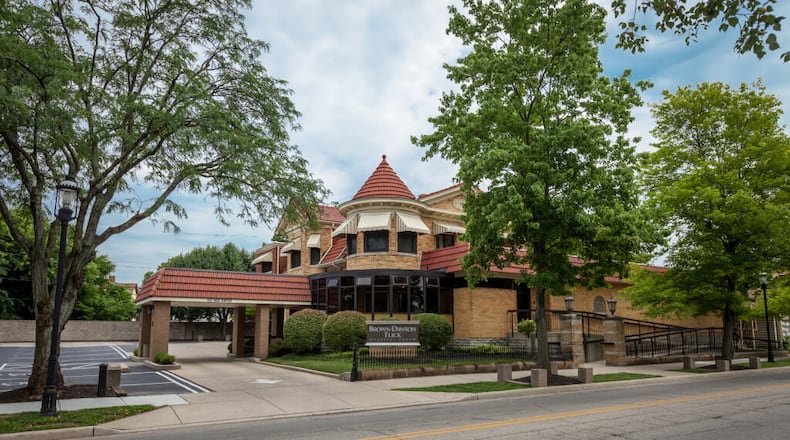“What Brown-Dawson-Flick is trying to do, which is sort of unique to them, is to follow up with all the families that they serve to make sure that everything went well for them and if there was anything else the funeral home can be of service with,” said Ogle, an Oxford native and Talawanda graduate.
Ogle’s working relationship, in many ways, will interact with Brown-Dawson-Flick’s pre-needs specialist Mike Gedert, who helps folks proactively get relevant tasks squared away before death. The duo is intended to help mitigate the problems families face from the overwhelming plethora of logistical questions that come up after a family member’s death, while also aiding in emotional mourning.
“We always want our families to know that just because the funeral’s over, our service to them doesn’t stop,” Gedert said. “We know it’s a journey, it’s not just a cut-and-dry thing when you have a death. We want them to know that we’re there for them through that journey, too.”
Ogle’s specific role will be to reach out to families within a few weeks of the funeral as a sort of emotional check-in, a conversation she said is necessary for funeral homes that want to provide better comprehensive care.
“It’s a very tough adjustment period for [families], and as a former funeral director, I always felt like we would take care of families and then we would get them to the grave site or give them back their cremated remains and then kind of send them off,” Ogle said. “I always felt like there’s so much more to help them through.”
Ogle, a licensed grief counselor, said her new role will have her facilitating grief support groups, which she said will soon be open to anyone in Hamilton struggling with the loss of a loved one. Gedert said Brown-Dawson-Flick will begin offering those sessions soon.
“There may be that one person where it hits a little harder,” Gedert said. “She can help them understand that everyone reacts differently to a death and we want the family to be very aware that if they have someone in the family (like that), we’ll be supportive and help point them in the right direction,” Gedert said.
Gedert said Ogle’s experience will allow her to help families navigate their mourning logistically, too, by answering practical questions and helping families tie up loose ends, whether that’s through executing a will or providing families with a checklist of what’s left to do.
“That’s why Kim’s the perfect person for it, because she knows the logistical part from being a funeral director, but she knows the emotional part from being a counselor, too,” Gedert said.
Ogle said an informal version of after-care was baked-in to the job duties of growing up in and eventually operating a small town’s sole funeral home, as she did.
“When you grow up in Oxford, most of the people we served were friends,” Ogle said. “We knew the people that we were serving, and that made it especially special for us and difficult at times, because these are our friends.”
Now, in a changing funeral service industry, Ogle said she believes it’s necessary for funeral homes like Brown-Dawson-Flick to expand the services they offer as more and more people opt for cremation and have the ability to forego funeral homes entirely.
Ogle asked, in those scenarios, “What other services can the funeral home provide?”
Gedert said Brown-Dawson-Flick had been interested in providing after-care services to its customers for years, even reaching out to Ogle before the pandemic disrupted and ultimately overwhelmed the already-changing funeral service industry. But, it’s a service that Gedert said can’t be done halfway and requires a dedicated, qualified staff member — part of why it’s a relatively rare offering.
“It’s getting so hard to maintain a full staff and keep it within a budget because cremation is becoming a more prevalent thing, and that causes there to be more budget cuts. Most funeral homes have great staffing for at-need funerals, but to have somebody actively doing [after-care] can put a strain on things,” Gedert said.
Gedert said Brown-Dawson-Flick wanted to know that, once they began offering after-care services, they’d be able to offer it uniformly to all their customers, even if they don’t necessarily need the full extent of the service.
“[It] can really help brighten the person’s day a little bit to know that somebody else is out there and if they need something, we’ll be there for them,” Gedert said.
About the Author

